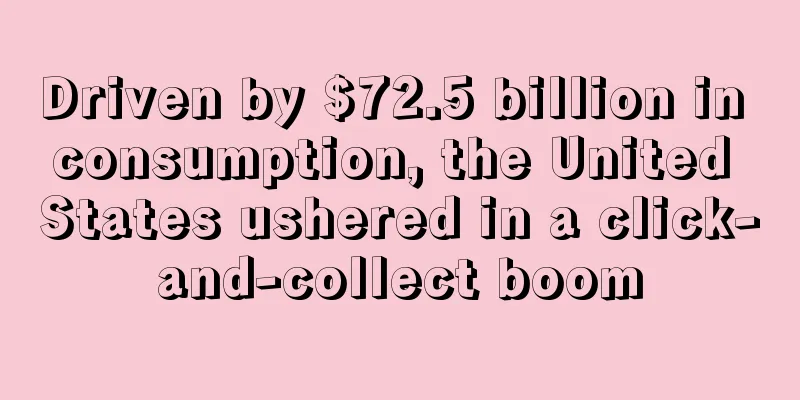Driven by $72.5 billion in consumption, the United States ushered in a click-and-collect boom

|
In 2020, U.S. shoppers spent $72.46 billion through click and collect (delivery method), accounting for 9.1% of all e-commerce sales. This year, this figure is expected to increase by 9.9% to $83.47 billion.
Relevant data shows that seven major click-and-collect multi-channel retailers account for 64.0% of click-and-collect sales in the United States , such as Walmart, Home Depot, Best Buy, Target, Lowe's, Macy's and Nordstrom, with a total click-and-collect sales of more than $46 billion.
These seven companies are representative of the companies that have taken advantage of the surge in sales from click and collect interest. Among them, Target's sales increased by 734% in the second quarter of 2020, and then maintained a year-on-year growth of 500% in the next quarter. Despite the large-scale shift to curbside service, Target's in-store click and collect also increased by more than 60% in the second and third quarters of 2020, and increased by more than 50% in the third quarter.
As consumers got used to these options, momentum accelerated: In a March 2021 earnings call, Target reported that Drive Up sales had grown more than 600% for all of 2020, and in-store pickup had grown more than 70%.
Home Depot reported more than 60% digital sales in its second and third quarters of 2020, a figure that was heavily influenced by in-store pickup. Lowe’s reported a nearly identical ratio of delivery to in-store pickup for the year, as well as 111% year-over-year e-commerce sales growth in 2020. Best Buy recently reported that 48% of its online sales were picked up in stores in 2020.
Taken together, these data points paint a vivid picture. For these major retailers, click and collect accounts for more than a third of all their e-commerce sales. Among the “top five” click and collect retailers, returning customers account for 41.9% of their e-commerce sales and more than half of their e-commerce growth last year.
Click-and-collect has proven to be a driver of e-commerce growth for large U.S. retailers in 2020, including The Home Depot (73.4% of e-commerce growth), Lowe's (72.1%), and Best Buy (44.8%).
Home improvement retailers were the easiest to click and collect, given the size and weight of many products, and the fact that buyers, including small businesses, contractors and repair service providers, often need to purchase these products immediately. Big-package retailers followed home improvement retailers, followed by Macy’s and Nordstrom, which had the fewest changes to click and collect.
The lower figures for department stores can be partly attributed to the complete closure of certain stores during the COVID-19 pandemic, which ruled out click and collect and forced customers into traditional e-commerce delivery methods. In addition, demand for apparel was lower last year compared to other product categories. However, the lower click and collect rates for department stores can be attributed to consumers who still prefer home delivery over purchasing lower priority, less time-sensitive items such as apparel and accessories. USA Click to Collect Consumption |
<<: Target pledges $2 billion to support Black-owned businesses
>>: Indonesian platform Blibli holds Ramadan shopping festival, offers two-hour delivery service
Recommend
What is alimice? alimice Review, Features
alimice is a website that produces human hair prod...
What is Caraway? Caraway Review, Features
Caraway is about making thoughtfully designed home...
A small town has a big seller on Amazon!
Another big exporter is preparing to go public on...
Alibaba International Station's digital foreign trade services have been further enhanced with digital logistics services, with more than 26,000 global transport lines
On September 3 , Alibaba International Station la...
Take it off the shelves immediately! With sales exceeding 3.5 million, is this a popular kitchen item also infringing copyright?
There is a product on YouTube that is called a &q...
What is JC Penney? JC Penney Review, Features
JC Penney was founded by James Penney in 1902 in a...
The seller panicked! He gave up his store and received a domestic court summons
Infringement cases occur frequently in the cross-...
Contactless spending in the UK grows 30%
On August 24, according to foreign media reports,...
A large number of Amazon accounts were suddenly subject to second review, and more than 30 sellers’ accounts were affected
According to folk custom, the sixth day of the Lu...
Reaching new heights! Buy iPhone 15 for 0 Yuan on Amazon
The internal competition among Amazon sellers has...
Due to an Amazon outage, the seller was deducted 1.71 million and the store was closed!
Imagine that you suddenly received an IOU for $91...
Many big sellers are about to explode in the new blue ocean
Outside of Europe and the United States, cross-bo...
Note to sellers: HTML tags cannot be used on product description pages!
Some time ago, Amazon Japan announced that seller...
Is the seller easy to bully? The buyer's malicious claim was rejected but he still asked for a refund
The issue of returns and exchanges has always bee...
What is N12H? N12H Review, Features
N12H is an American womenswear brand founded in 2...









